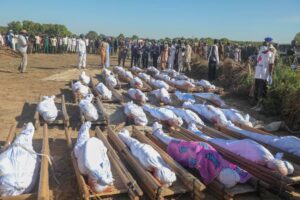By Michy Abraham in Maiduguri
The number of farmers that might have been slew by Boko Haram on the rice field in Borno may be more that 43 after all.
The UN had on Sunday claimed that over 110 farmers were killed only to recant on Monday, choosing to state that tens of people were killed.
In a statement on Monday, the Nigeria International NGO Forum (NIF) community added a new twist to the number of farmers actually killed in the attack.
The NIF said that not less than 86 civilians were killed by Boko Haram in the attack.
A statement issued on Monday by NIF, which said the community is still in shock, claimed, the attack resulted in at least 86 death of civilians.
The statement however admitted that more people, though unconfirmed, remained missing and injured.
The statement read: “The Nigeria INGO Forum (NIF) expresses its condolences to the families of those who lost their lives and wishes fast recovery to those who were injured.
“In North East Nigeria, civilians continue to suffer from the devastating consequences of the more than decade-long armed conflict and to pay the price for the blatant violations of international law that provide for their protection – at least 36,000 civilians were killed in the region since the beginning of the conflict.
“Since the beginning of the farming season in June 2020 alone, more than a hundred farmers have been killed across Borno State. Those figures and the fact that a similar attack was recorded last year indicate that this is not a standalone attack but a concerning trend related to people accessing farmland.
“In addition to its inhumane brutality, this type of attacks endangers food security in the North East – only three months ago the United Nations warned that the conflict in the North East has put Nigeria among the countries most at risk of famine.
“Such attacks represent, together with the threat caused by explosive remnants of war, the main reasons why safe access to farming land is constrained. In an area where farming represents the main source of livelihoods, projections for the coming months show that food security indicators risk dropping to food crisis levels – or famine in case of major shocks.
“While humanitarian organisations (including NIF members) support food security and livelihoods programmes in the area, the sustainability of assistance is hindered by the deteriorating security situation at a time when humanitarian needs are on the rise.”
The statement added that the Nigeria INGO Forum and its 54 INGO members:
“Strongly condemn the intentional killing of civilians, as well as the terrorizing of the civilian population in the North East, recalling that these acts are serious crimes under international law.”
It urged all parties to the conflict to abide by their obligations under international law, including international humanitarian law, and to take all appropriate measures to ensure the protection of civilians and their adequate access to food and livelihood.
It called on the international community to advance dialogue between parties towards finding political solutions to bring an end to the 11-year conflict and violence in North East Nigeria.
![]()






